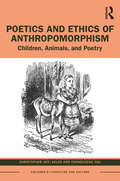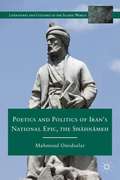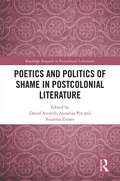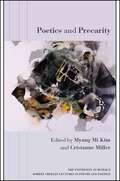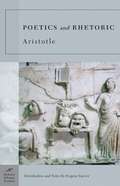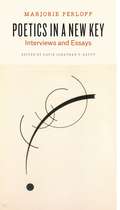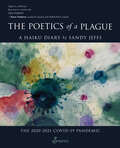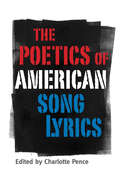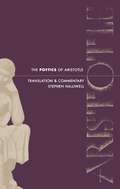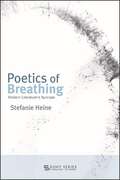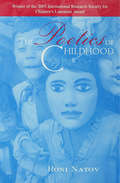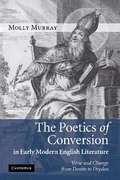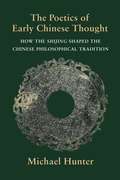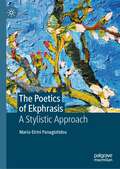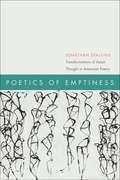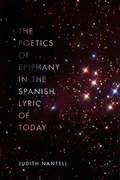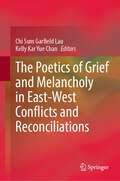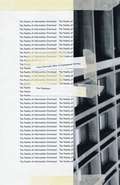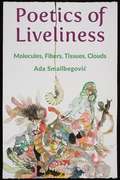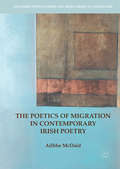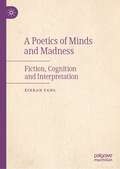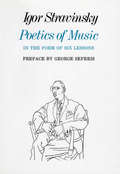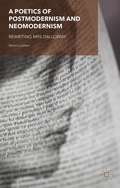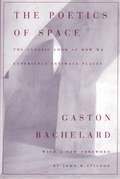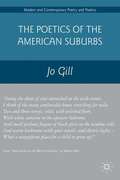- Table View
- List View
Poetics and Ethics of Anthropomorphism: Children, Animals, and Poetry (Children's Literature and Culture)
by Christopher Kelen Jo You ChengchengPoetics and Ethics of Anthropomorphism: Children, Animals, and Poetry investigates a kind of poetry written mainly by adults for children. Many genres, including the picture book, are considered in asking for what purposes ‘animal poetry’ is composed and what function it serves. Critically contextualising anthropomorphism in traditional and contemporary poetic and theoretical discourses, these pages explore the representation of animals through anthropomorphism, anthropocentrism, and through affective responses to other-than-human others. Zoomorphism – the routine flipside of anthropomorphism – is crucially involved in the critical unmasking of the taken-for-granted textual strategies dealt with here. With a focus on the ethics entailed in poetic relations between children and animals, and between humans and nonhumans, this book asks important questions about the Anthropocene future and the role in it of literature intended for children. Poetics and Ethics of Anthropomorphism: Children, Animals, and Poetry is a vital resource for students and for scholars in children’s literature.
Poetics and Politics of Iran’s National Epic, the Shāhnāmeh
by Mahmoud OmidsalarThis book considers some of the Western interpretations of The Shahnameh - Iran's national epic, and argues that these interpretations are not only methodologically flawed, but are also more revealing of Western concerns and anxieties about Iran than they are about the Shahnameh.
Poetics and Politics of Shame in Postcolonial Literature (Routledge Research in Postcolonial Literatures)
by David Attwell Annalisa Pes Susanna ZinatoPoetics and Politics of Shame in Postcolonial Literature provides a new and wide-ranging appraisal of shame in colonial and postcolonial literature in English. Bringing together young and established voices in postcolonial studies, these essays tackle shame and racism, shame and agency, shame and ethical recognition, the problem of shamelessness, the shame of willed forgetfulness. Linked by a common thread of reflections on shame and literary writing, the essays consider specifically whether the aesthetic and ethical capacities of literature enable a measure of stability or recuperation in the presence of shame’s destructive potential. The obscenity of the in-human, both in the colonial setting and in aftermaths that show little sign of abating, entails the acute significance of shame as a subject for continuing and urgent critical attention.
Poetics and Precarity (The University at Buffalo Robert Creeley Lectures in Poetry and Poetics)
by Myung Mi Kim; Cristanne MillerAt a time when wars, acts of terrorism, and ecological degradation have intensified and isolationism, misogyny, and ethnic divisiveness have been given distinctively more powerful voice in public discourse, language itself often seems to have failed. The poets and critics in this book argue that language has the potential to address this increasing level of discord and precarity, and they negotiate ways to understand poetics, or the role of the poetic, in relation to language, the body politic, the human body, breath, the bodies of the natural environment, and the body of form.Poetry makes urgent issues audible and poetics helps to theorize those issues into critical consciousness. Poetry also functions as a cry to protest late capitalist imperialism, misogyny, racism, climate change, and all the debilitating conditions of everyday life. Hubs of concern merge and diverge; precarity takes differently gendered, historied, embodied, geopolitical manifestations. The contributors articulate a poetics that renders what has not yet been crystallized as discourse into fields of force. They also acknowledge the beauties of sound, poetry, and music, and celebrate the power of community, marking the surge of energy that can occur at a particular place at a particular moment. Ultimately, Poetics and Precarity fosters further conversations that will imagine the concerns of poetics as a continuously emerging field.
Poetics And Rhetoric (Barnes And Noble Classics)
by Aristotle George Stade S. H. Butcher Eugene Garver W. Rhys RobertsPoetics and Rhetoric, by Aristotle, is part of the Barnes & Noble Classics series, which offers quality editions at affordable prices to the student and the general reader, including new scholarship, thoughtful design, and pages of carefully crafted extras. <P><P> Here are some of the remarkable features of Barnes & Noble Classics: New introductions commissioned from today's top writers and scholars Biographies of the authors Chronologies of contemporary historical, biographical, and cultural events Footnotes and endnotes Selective discussions of imitations, parodies, poems, books, plays, paintings, operas, statuary, and films inspired by the work Comments by other famous authors Study questions to challenge the reader's viewpoints and expectations Bibliographies for further reading Indices & Glossaries, when appropriate All editions are beautifully designed and are printed to superior specifications; some include illustrations of historical interest. Barnes & Noble Classics pulls together a constellation of influences--biographical, historical, and literary--to enrich each reader's understanding of these enduring works. <P><P> It is no exaggeration to say that all Western literary criticism flows from Aristotle. In the Poetics he focuses mainly on drama, especially tragedy, and introduces ideas that are still being debated more than two thousand years later. Among them is the often misunderstood theory of the unities of action, place, and time, as well as such concepts as: art as a form of imitation, and drama as an imitation of human actions; plot as a drama’s central element, and "reversal” and "recognition” as important elements within a plot; and the purging of pity and fear from the audience as the function of tragedy. Rather than offer these ideas merely as abstract theories, Aristotle applies them in cogent analyses of the classic Greek dramas--the tragedies of Aeschylus, Sophocles, and Euripides. <P><P> In the Rhetoric, Aristotle turns to the principles of persuasive writing, including argumentation and the logical development of proof, appeals to emotion, and matters of delivery and style. Perhaps most essentially, Aristotle teaches us how to engage in the central civic activities of accusing and defending, recommending policies, and proving and refuting ideas. <P><P> These two foundational works are key documents for understanding the culture and politics of Western civilization, and how they continue to evolve today. <P><P> Eugene Garver is Regents Professor of Philosophy at Saint John’s University, Collegeville, Minnesota. He is the author of Machiavelli and the History of Prudence, Aristotle’s Rhetoric: An Art of Character, For the Sake of Argument: Practical Reasoning, Character, and the Ethics of Belief, and the forthcoming Living with Thought: A Confrontation with Aristotle’s Ethics.
Poetics in a New Key: Interviews and Essays
by Marjorie Perloff edited by David Jonathan Y. BayotMarjorie Perloff writes in her preface to Poetics in a New Key that when she learned David Jonathan Y. Bayot wanted to publish a collection of her interviews and essays, she was "at once honored and mystified. ” But to Perloff’s surprise and her readers’ delight, the resulting assembly not only presents an accessible and provocative introduction to Perloff’s critical thought, but also highlights the wide range of her interests, and the energetic reassessments and new takes that have marked her academic career. The fourteen interviews in Poetics in a New Key--conducted by scholars, poets, and critics from the United States, Denmark, Norway, France, and Poland, including Charles Bernstein, Hélène Aji, and Peter Nicholls--cover a broad spectrum of topics in the study of poetry: its nature as a literary genre, its current state, and its relationship to art, politics, language, theory, and technology. Also featured in the collection are three pieces by Perloff herself: an academic memoir, an exploration of poetry pedagogy, and an essay on twenty-first-century intellectuals. But across all the interviews and essays, Perloff’s distinctive personality and approach to reading and talking resound, making this new collection an inspiring resource for scholars both of poetry and writing.
The Poetics of a Plague, A Haiku Diary: The 2020-2021 COVID-19 Lockdown
by Sandy JeffsWhat was it like to live in Melbourne during the 2020 2.0 lockdown? Capturing the day-to-day struggles of lockdown, the daily news, Dan Andrews' 11am morning press conferences, the tensions between Victorians and the rest of Australia, Trump's chaotic America, the conspiracy theories that circulated and battling her own mental health, Sandy Jeffs takes us through the whirlwind of events in imaginative haiku poems. These became her sanity while the world spiralled into madness. First wave fear is back. Before an end was in sight now there is no end. trying to make sense of an unravelling world that is downright mad. This is not only a book about the pandemic but also about political wins and political failures. From Dan Andrews to Donald Trump. Each day brings news that creates despair or joy: the pandemic numbers and the voting numbers side by side. And as the world is in the grip of COVID madness, sanity is found in poetry.
The Poetics of American Song Lyrics (American Made Music Series)
by Charlotte PenceThe Poetics of American Song Lyrics is the first collection of academic essays that regards songs as literature and that identifies intersections between the literary histories of poems and songs. The essays by well-known poets and scholars including Pulitzer Prize winner Claudia Emerson, Peter Guralnick, Adam Bradley, David Kirby, Kevin Young, and many others, locate points of synthesis and separation so as to better understand both genres and their crafts. The essayists share a desire to write on lyrics in a way that moves beyond sociological, historical, and autobiographical approaches and explicates songs in relation to poetics. Unique to this volume, the essays focus not on a single genre but on folk, rap, hip hop, country, rock, indie, soul, and blues. The first section of the book provides a variety of perspectives on the poetic history and techniques within songs and poems, and the second section focuses on a few prominent American songwriters such as Bob Dylan, Bruce Springsteen, and Michael Stipe. Through conversational yet in-depth analyses of songs, the essays discuss sonnet forms, dramatic monologues, Modernism, ballads, blues poems, confessionalism, Language poetry, Keatsian odes, unreliable narrators, personas, poetic sequences, rhythm, rhyme, transcription methods, the writing process, and more. While the strategies of explication differ from essay to essay, the nexus of each piece is an unveiling of the poetic history and poetic techniques within songs.
The Poetics Of Aristotle: Translation And Commentary
by Stephen HalliwellIncorporating the best modern work on the Poetics, Halliwell's translation is aimed at those who want a reliable version of Aristotle's ideas along with concise and stimulating guidance. <P><P> A running commentary explains the structure and detail of Aristotle's argument, attempts to provoke further thought about the work's strengths and weaknesses, and offers suggestions on relating the Poetics to later stages of literary theory and practice.
Poetics of Breathing: Modern Literature's Syncope (SUNY series, Literature . . . in Theory)
by Stefanie HeineBreathing and its rhythms—liminal, syncopal, and usually inconspicuous—have become a core poetic compositional principle in modern literature. Examining moments when breath's punctuations, cessations, inhalations, or exhalations operate at the limits of meaningful speech, Stefanie Heine explores how literary texts reflect their own mediality, production, and reception in alluding to and incorporating pneumatic rhythms, respiratory sound, and silent pauses. Through close readings of works by a series of pairs—Jack Kerouac and Allen Ginsberg; Robert Musil and Virginia Woolf; Samuel Beckett and Sylvia Plath; and Paul Celan and Herta Müller—Poetics of Breathing suggests that each offers a different conception of literary or poetic breath as a precondition of writing. Presenting a challenge to historical and contemporary discourses that tie breath to the transcendent and the natural, Heine traces a decoupling of breath from its traditional association with life, and asks what literature might lie beyond.
The Poetics of Childhood (Children's Literature And Culture Ser.)
by Roni NatovChildren's literature provides a medium through which writers re-create or approximate the sensibility of a child. But what exactly is this sensibility, and how does it find creative expression in adulthood? What language can portray the seemingly untranslatable experience of a child?The Poetics of Childhood, winner of the 2005 International Resear
The Poetics of Conversion in Early Modern English Literature
by Molly MurrayChristians in post-Reformation England inhabited a culture of conversion. Required to choose among rival forms of worship, many would cross - and often recross - the boundary between Protestantism and Catholicism. This study considers the poetry written by such converts, from the reign of Elizabeth I to that of James II, concentrating on four figures: John Donne, William Alabaster, Richard Crashaw, and John Dryden. Murray offers a context for each poet's conversion within the era's polemical and controversial literature. She also elaborates on the formal features of the poems themselves, demonstrating how the language of poetry could express both spiritual and ecclesiastical change with particular vividness and power. Proposing conversion as a catalyst for some of the most innovative devotional poetry of the period, both canonical and uncanonical, this study will be of interest to all specialists in early modern English literature.
The Poetics of Early Chinese Thought: How the Shijing Shaped the Chinese Philosophical Tradition
by Michael HunterThe modern imagination of classical Chinese thought has long been dominated by Confucius, Mozi, Mencius, and other so-called “Masters” of the Warring States period. Michael Hunter argues that this approach neglects the far more central role of poetry, and the Shijing (Classic of Poetry) in particular, in the formation of the philosophical tradition. Through a new reading of its ideology and poetics, Hunter reestablishes the Shijing as a work of major intellectual-historical significance. The Poetics of Early Chinese Thought demonstrates how Shi poetry weaves a vision of society united at every level by the innate and universal impulse to come home. The Shi immersed early thinkers in a world of movement and flow in order to teach them that the most powerful current of all was the gravitational pull of a virtuous king, without whom people can never truly feel at home. Hunter traces the profound influence of the Shi ideology across numerous sources of classical Chinese thought, which he recasts as a network centered on the Shi. Reframing the tradition in this way reveals how poetry shaped ancient Chinese thinkers’ conception of the world and their place within it.This book offers both a sweeping critique of how classical Chinese thought is commonly understood and a powerful new way of studying it.
The Poetics of Ekphrasis: A Stylistic Approach
by Maria-Eirini PanagiotidouThis book provides a stylistic and cognitive poetic account of ekphrastic poetry (poetry whose subject matter is predominantly artworks and images), examining the linguistic processes through which works of art can become literary objects. The author sheds light on the workings of ekphrasis at a textual level, while also considering the cognitive and psychological effects of reading ekphrastic poems, developing cognitive and stylistic analytical frameworks grounded on the four principles that govern ekphrasis: representation, narrativization, transposition, and collaboration. This book will be of interest to academics and practitioners in various fields, including literary critics, art critics, rhetoricians, poets, visual artists, and stylisticians.
Poetics of Emptiness
by Jonathan StallingThe Poetics of Emptiness uncovers an important untold history by tracing the historically specific, intertextual pathways of a single, if polyvalent, philosophical term, emptiness, as it is transformed within twentieth-century American poetry and poetics. This conceptual migration is detailed in two sections. The first focuses on transpacific Buddhist poetics, while the second maps the less well-known terrain of transpacific Daoist poetics. In Chapters 1 and 2, the author explores Ernest Fenollosa's The Chinese Written Character as a Medium for Poetryas an expression of Fenollosa's distinctly Buddhist poetics informed by a two-decade-long encounter with a culturally hybrid form of Buddhism known as Shin Bukkyo (New Buddhism). Chapter 2 explores the classical Chinese poetics that undergirds the lost half of Fenellosa's essay. Chapter 3 concludes the first half of the book with an exploration of the didactic and soteriological function of emptinessin Gary Snyder's influential poetry and poetics. The second half begins with a critical exploration of the three-decades-long career of the poet/translator/critic Wai-lim Yip, whose transpacific Daoist poeticshas been an important fixture in American poetic late modernism and has begun to gain wider notoriety in China. The last chapter engages the intertextual weave of poststructural thought and Daoist and shamanistic discourses in Theresa Hak Kyung Cha's important body of heterocultural productions. By formulating interpretive frames as hybrid as the texts being read, this book makes available one of the most important yet still largely unknown stories of American poetry and poetics
The Poetics of Epiphany in the Spanish Lyric of Today
by Judith NantellDrawing on the poetry of four major voices in the Spanish lyric of today, Judith Nantell explores the epistemic works of Luis Muñoz, Abraham Gragera, Josep M. Rodríguez, and Ada Salas, arguing that, for them, the poem is the fundamental means of exploring the nature of both knowledge and poetry. In this first interpretive analysis of the epistemic nature of their poetry, Nantell innovatively engages these poets, each of whom has contributed one of their own poems along with a previously unpublished explication of their chosen poem. Each also provides an original biographical sketch to support Nantell’s development of a poetics of epiphany.
The Poetics of Grief and Melancholy in East-West Conflicts and Reconciliations
by Chi Sum Garfield Lau Kelly Kar Yue ChanThis book is a collection of academic essays that examines the representation, esthetics and dichotomy of the notions of grief and melancholy in East–West exchanges and cultural dialogues. It explores the topic in the dimensions of individual behaviors under specific social norms and cultural products such as literature, film and any other forms of arts/genres, etc.In his 1917 work Mourning and Melancholia (Trauer und Melancholie), Sigmund Freud connected the grief of loss with melancholic emotions which may give rise to acts of mourning. He suggested that “[i]n mourning it is the world which has become poor and empty; in melancholia it is the ego itself” (Freud, 1917: 246). Inspired by Freud’s stance and with the goal of providing up-to-date intellectual resources for academics, researchers and students with ardent interests in the varying exemplifications of grief and melancholy in Sino-Western contexts, the book serves more than a discussion over the pragmatic and ritualistic connections of grief and melancholy in relation to the inner self and the external world. It aims at the pursuit of a contemporary theorization of grief and melancholy beyond its modern limits.
The Poetics of Information Overload
by Paul StephensInformation overload is a subject of vital, ubiquitous concern in our time. The Poetics of Information Overload reveals a fascinating genealogy of information saturation through the literary lens of American modernism. Although technology has typically been viewed as hostile or foreign to poetry, Paul Stephens outlines a countertradition within twentieth- and twenty-first-century literature in which avant-garde poets are centrally involved with technologies of communication, data storage, and bureaucratic control. Beginning with Gertrude Stein and Bob Brown, Stephens explores how writers have been preoccupied with the effects of new media since the advent of modernism. He continues with the postwar writing of Charles Olson, John Cage, Bern Porter, Hannah Weiner, Bernadette Mayer, Lyn Hejinian, and Bruce Andrews, and concludes with a discussion of conceptual writing produced in the past decade.By reading these works in the context of information systems, Stephens shows how the poetry of the past century has had, as a primary focus, the role of data in human life.
Poetics of Liveliness: Molecules, Fibers, Tissues, Clouds
by Ada SmailbegovićCan poetry act as an aesthetic amplification device, akin to a microscope, through which we can sense minute or nearly imperceptible phenomena such as the folding of molecules into their three-dimensional shapes, the transformations that make up the life cycle of a silkworm, or the vaporous movements that constitute the ever-shifting edges of clouds? We tend to think of these subjects as reserved for science, but, as Ada Smailbegović argues, twentieth- and twenty-first-century writers have intermingled scientific methodologies with poetic form to reveal unfolding processes of change. Their works can be envisioned as laboratories within which the methodologies of experimentation, natural historical description, and taxonomic classification allow poetic language to register the rhythms and durations of material transformation.Poetics of Liveliness moves across scales to explore the realms of molecules, fibers, tissues, and clouds. It investigates works such as Christian Bök’s insertion of a poetic text into the DNA code of living bacteria in order to generate a new poem in the shape of a protein molecule, Jen Bervin’s considerations of silk fibers and their use in biomedicine, Gertrude Stein’s examination of brain tissues in medical school and its subsequent influence on her literary taxonomies of character, and Lisa Robertson’s studies of nineteenth-century meteorology and the soft architecture of clouds. In their attempt to understand physical processes unfolding within lively material worlds, Smailbegović contends, these poets have developed a distinctive materialist poetics. Structured as a poetic cosmology akin to Lucretius’s “On the Nature of Things,” which begins at the atomic level and expands out to the vastness of the universe, Poetics of Liveliness provides an innovative and surprising vision of the relationship between science and poetry.
The Poetics of Migration in Contemporary Irish Poetry
by Ailbhe McDaidThis book offers fresh critical interpretation of two of the central tenets of Irish culture - migration and memory. From its starting point with the 'New Irish' generation of poets in the United States during the 1980s and concluding with the technological innovations of 21st-century poetry, this study spans continents, generations, genders and sexualities to reconsider the role of memory and of migration in the work of a range of contemporary Irish poets. Combining sensitive close readings and textual analysis with thorough theoretical application, it sets out the formal, thematic, socio-cultural and literary contexts of migration as an essential aspect of Irish literature. This book is essential reading for literary critics, academics, cultural commentators and students with an interest in contemporary poetry, Irish studies, diaspora studies and memory studies.
A Poetics of Minds and Madness: Fiction, Cognition and Interpretation
by XINRAN YANGThis monograph aims to explore the mind-narrative nexus by conducting a cognitive narratological study on the mad minds in fictional narratives. Set on the interface of narrative and cognitive science (cognitive linguistics, cognitive psychology and cognitive neuropsychology), it adopts an indirect empirical approach to the fictional representation of madness. The American writer Ken Kesey’s novel One Flew Over the Cuckoo’s Nest is chosen as the primary text of investigation, whereas due consideration is also given to other madness narratives when necessary. This book not only demonstrates the value of reading and rereading literary classics in the modern era, but also sheds light on the studies of cognitive narratology, cognitive poetics, madness narratives and literature in general.
Poetics of Music
by Igor Stravinsky Arthur Knodel Ingolf DahlThese lessons provide penetrating glimpses into the thought processes of Stravinsky's mind. While dealing with his chosen topics-the phenomenon of music, the composition of music, musical typology, the avatars of Russian music, and the performance of music-he reveals his reverence for tradition, order and discipline. He believes 'the more art is controlled, limited, worked over, the more it is free. His opinions about Wagner, Verdi, Berlioz, Hindemith, Weber, Beethoven, Glinka, Tchaikovsky, Moussorgsky and Bach are refreshing. He also analyzes the function of the critic, the requirements of the interpreter, the state of Russian music, and musical taste and snobbery." - The American Recorder Once again the concertgoer and music lover can take pleasure in Igor Stravinsky's thoughts on the essentials of music. It was over thirty years ago that Stravinsky delivered the Charles Eliot Norton Lectures at Harvard University on which the French-language edition of this book and later the English translation by Arthur Knodel and Ingolf Dahl were based. Now his Poetics of Music is available in paper-with a preface by George Seferis.
A Poetics of Postmodernism and Neomodernism
by Monica LathamVirginia Woolf's Mrs Dalloway, one of the most significant modernist texts from the Western literary canon, has spawned numerous contemporary offspring. Contemporary authors have dialogued with it, challenged it, reinvented it and offered creative responses to it, thus reinforcing its accumulated critical reputation and canonical status. After meticulously tracing the genesis of Woolf's most iconic novel so as to examine the production of Woolf's idiosyncratic Dalloway-esque signature, A Poetics of Postmodernism and Neomodernism sets out to explore its reproduction by a variety of postmodernist and neomodernist Anglo-American writers who are either openly indebted to Woolf's novel or covertly influenced by it. The contemporary tributes that are indebted to Mrs Dalloway in so many ways have rejuvenated the Woolfian novel and have propelled it into the twenty-first century. Almost a hundred years after its publication, Woolf's Mrs Dalloway has proved to be an enduring text, an 'ice-breaking vessel' which continues to invite 'individual talents' to follow in its wake.
The Poetics of Space
by Gaston Bachelard John R. StilgoeThirty years since its first publication in English, French philosopher Gaston Bachelard's The Poetics of Space one of the most appealing and lyrical explorations of home. Bachelard takes us on a journey, from cellar to attic, to show how our perceptions of houses and other shelters shape our thoughts, memories, and dreams.
The Poetics of the American Suburbs
by Jo GillThe first scholarly study of the rich body of poetry that emerged from the post-war American suburbs, Gill evaluates the work of forty poets, including Anne Sexton, Langston Hughes, and John Updike. Combining textual analysis and archival research, this book offers a new perspective on the field of twentieth-century American literature.
